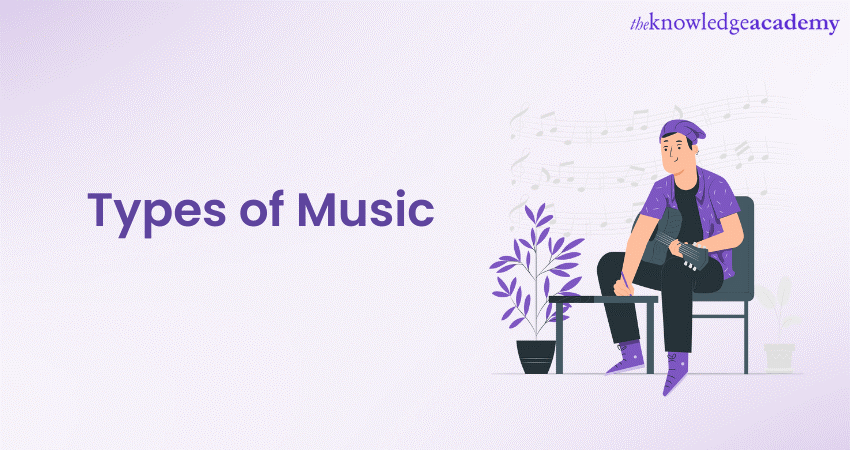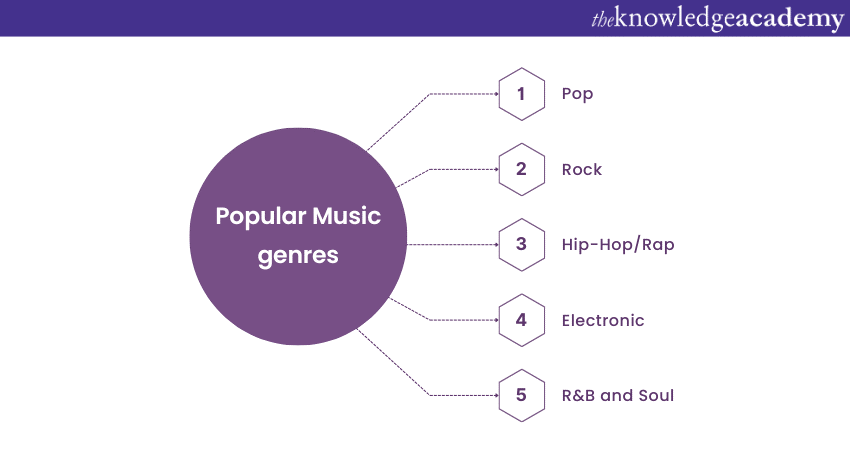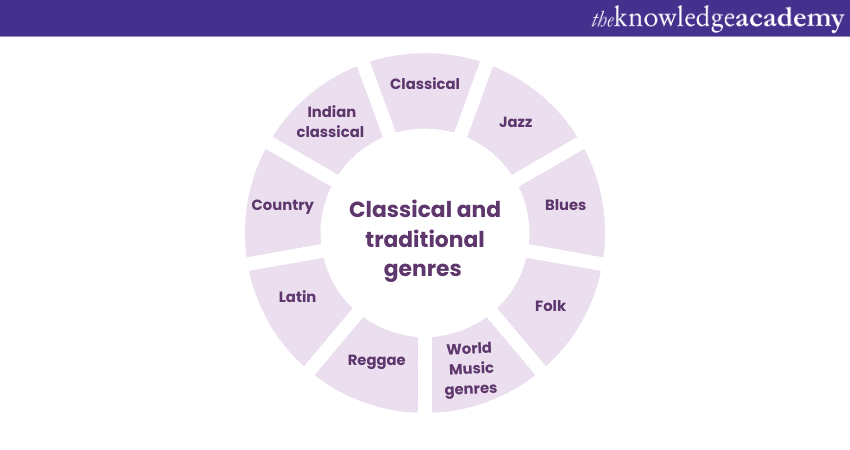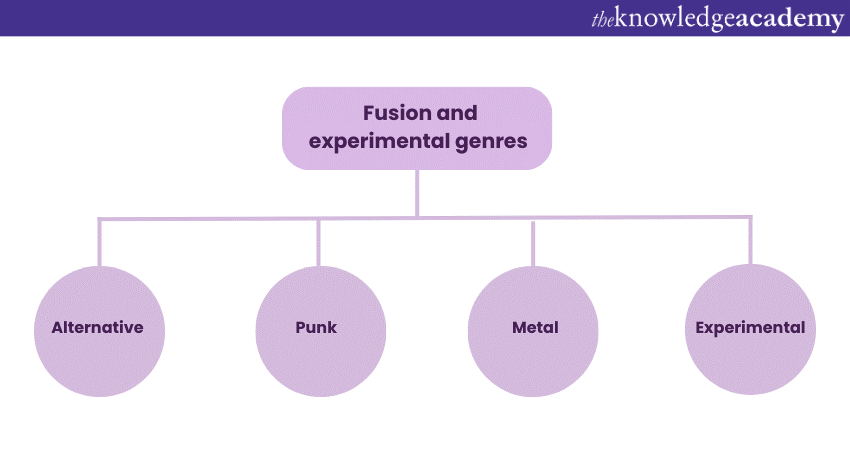We may not have the course you’re looking for. If you enquire or give us a call on +44 1344 203999 and speak to our training experts, we may still be able to help with your training requirements.
We ensure quality, budget-alignment, and timely delivery by our expert instructors.

Music, an intricate tapestry woven through the fabric of human culture, transcends language and time, resonating with emotions and experiences that words alone can't capture. As the heartbeat of societies, it reflects the evolution of our identities, beliefs, and aspirations. This blog will explore different types of Music, understanding the Musical expression that has shaped civilisations.
Table of Contents
1) Popular Music genres
2) Classical and traditional genres
3) World Music genres
4) Fusion and experimental genres
5) The globalisation of Music
6) Conclusion
Popular Music genres
In Music, popular genres are pillars of global soundscapes, shaping trends, capturing hearts, and etching memories. These genres uniquely resonate with broad audiences, transcending boundaries and connecting people across continents. Through Music journalism and music analysis, we can take a closer look at the types of music genres:

Pop
As one of the prominent types of Music genres, pop Music is the vibrant heart of modern Musical expressions. Its charm stems from its versatility, readily embracing diverse styles and influences. Pop crafts a recognisable yet refreshing fusion by seamlessly integrating elements from other genres.
Figures like Madonna, Michael Jackson, and Beyoncé have catapulted pop into a cultural phenomenon, their chart-topping hits orchestrating the melodies of countless lives. Whether resonating through '80s synth-driven melodies or today's electronic dance-pop beats, pop Music continues its metamorphosis, encapsulating the spirit of the times and mirroring societal shifts.
Rock
Within diverse types of Music genres, rock Music is a formidable force that has moulded generations and ignited countercultural movements. Born from an amalgamation of blues, jazz, and country influences, rock emerged during the mid-20th century with the audacious intent of challenging societal norms.
From the immortal riffs of Led Zeppelin and The Rolling Stones to the impassioned anthems of Nirvana and Green Day, the kaleidoscope of rock's variations is unmistakable in its subgenres—punk, alternative, indie, and beyond. A haven for rebellion, self-expression, and incisive social commentary, rock Music's enduring appeal continues to captivate audiences on a global scale. Its resounding legacy and ability to transcend time cement it as an eternal cornerstone of Musical innovation.
Hip-Hop/Rap
Hip-hop and rap are more than just genres; they are cultural movements that have given voice to marginalised communities, sparking conversations about race, inequality, and identity. Originating in the streets of New York City, hip-hop's rhythmic beats and eloquent rhymes quickly transcended its origins to become a global phenomenon.
Artists like Tupac Shakur, Notorious B.I.G., and Eminem brought street narratives to mainstream consciousness, while modern artists like Kendrick Lamar and Kanye West use their Music to address social issues, uniting listeners in their shared experiences.
Electronic
Electronic Music is a testament to the transformative power of technology in Music creation and is among the most popular types of Music. Music Production Equipment such as synthesisers, drum machines, and digital production techniques have birthed a genre characterised by endless sonic possibilities.
From the euphoric highs of trance to the underground depths of techno, electronic Music has spawned a vibrant club culture and global festival circuit. DJs and producers like David Guetta, Daft Punk, and Calvin Harris have brought electronic beats to the forefront, showcasing their expertise in music production and crafting soundscapes that take listeners on mesmerising journeys.
R&B and Soul
Soul and R&B (Rhythm and Blues) Music are the emotional cornerstones of popular Music, expressing deep feelings with stunning vocal performances and intricate arrangements. Rooted in gospel and blues traditions, R&B and soul have evolved into genres that embody love, heartbreak, and resilience.
Legends like Aretha Franklin, Marvin Gaye, and Stevie Wonder have set the standard for soulful expression, paving the way for modern artists like Alicia Keys and John Legend to carry the torch.
Learn the characteristics of sound and periodic waveform types, sign up for our Music Production Masterclass Training now!
Classical and traditional genres
Within the world of Music, classical and traditional genres stand as timeless testaments to human creativity and cultural heritage. These genres have roots that extend deep into history, offering a window into the past while maintaining their relevance in the modern world. Let's dive into the richness of classical and traditional Music with insights from music theory:

Classical
Classical Music is a grand tapestry woven with intricate compositions, masterful orchestrations, and emotional depth. Its origins can be traced back to the Middle Ages, reaching its zenith during the Baroque, Classical, and Romantic eras. Composers like Johann Sebastian Bach, Wolfgang Amadeus Mozart, and Ludwig van Beethoven created symphonies, concertos, and operas transcending time.
The genre's complexity demands precision and expertise, both from the performers and the audience, as it invites us to experience the grandeur of human expression through notes and melodies.
Jazz
Jazz is a genre that epitomises freedom of expression and improvisation. Emerging from African American communities in the late 19th century, jazz quickly became a cultural force that transcended racial and social barriers.
Characterised by syncopation, swing rhythms, and improvisational solos, jazz has various subgenres, including Dixieland, bebop, and fusion. Icons like Louis Armstrong, Duke Ellington, and Miles Davis pioneered jazz's evolution, while contemporary artists like Esperanza Spalding and Kamasi Washington continued to push their boundaries.
Discover why learning the piano is more than just music! Check out our blog, Benefits of Playing the Piano, to explore its impact on your mind and body.
Check out our blog How to Play Piano? and start your musical journey today!
Blues
Blues Music channels raw emotions and experiences through soulful vocals and expressive guitar work. Originating in the American Deep South among African American communities, the blues served as a means of catharsis during times of struggle.
Artists like Robert Johnson, B.B. King, and Muddy Waters poured their hearts into their Music, influencing generations of Musicians across genres. The blues gave rise to rock and roll and even laid the groundwork for hip-hop, showcasing its enduring impact on modern Music.
Folk
Folk Music is a genre deeply intertwined with cultural traditions and storytelling. It represents the voices of everyday people, capturing the essence of their lives, struggles, and celebrations. With roots in various cultures across the globe, folk Music is often characterised by acoustic instruments and lyrics that reflect shared experiences.
From Woody Guthrie's protest songs to the folk revival of the 1960s led by Bob Dylan and Joan Baez, the genre's narratives continue to echo through time, reminding us of our shared humanity.
Learn how to play guitar and produce attractive Music, sign up for our Guitar Masterclass now!
World Music genres
World Music genres are like windows into the diverse cultures and landscapes of our planet. These genres celebrate the unique rhythms, melodies, and instruments that characterise various regions, allowing listeners to embark on sonic journeys across continents. Let's explore the rich world of Music:
Reggae
Reggae Music originated in Jamaica and is synonymous with laid-back rhythms and socially conscious lyrics. Born out of the struggles and hopes of the Jamaican people, reggae became a voice for social change and unity. The iconic Bob Marley brought reggae to the global stage, infusing his Music with messages of love, peace, and liberation. With its distinctive offbeat rhythm and messages of positivity, reggae continues to inspire generations and spread messages of unity and equality.
Latin
Latin Music is a vibrant and diverse genre that encapsulates the rhythms and melodies of Latin America. From the fiery beats of salsa to the romantic ballads of bolero, Latin Music offers a kaleidoscope of emotions and sounds. Artists like Celia Cruz, Carlos Santana, and Shakira have brought Latin Music to international audiences, infusing their own unique styles while honouring their cultural roots. Latin Music's infectious energy and danceable rhythms have transcended borders, making it a global phenomenon.
Country
Country Music is an ode to rural life, often telling stories of heartbreak, love, and the simple joys of life. Rooted in the Southern United States, country Music's origins lie in folk and bluegrass traditions. Pioneers like Hank Williams and Johnny Cash paved the way for contemporary country stars like Dolly Parton and Garth Brooks. The genre's themes of authenticity and relatability resonate with listeners around the world, as country Music's emotional narratives touch the universal human experience.
Indian classical
Indian classical Music is an intricate tapestry of melody, rhythm, and spirituality that has evolved over the centuries. Rooted in ancient traditions, the genre is divided into two main schools: Hindustani and Carnatic. Ragas, which are intricate melodic structures, and talas, rhythmic cycles, form the foundation of Indian classical Music. Masters like Ravi Shankar and L. Subramaniam have showcased the genre's complexity and beauty on the global stage, captivating audiences with their virtuosity and cultural depth. Careers in music production offer opportunities to engage with and contribute to these rich musical traditions.
Fusion and experimental genres
Fusion and experimental genres are the laboratories of Musical innovation, pushing the boundaries of creativity and challenging conventional norms. These genres thrive on breaking moulds, blending influences, and creating new sonic landscapes that defy categorisation. Let's explore the captivating world of fusion and experimental Music:

Alternative
Alternative Music is a diverse genre that refuses to be confined by traditional labels. It emerged as a reaction to mainstream Music, offering an alternative to commercial sounds. Alternative rock, characterised by its raw energy and introspective lyrics, gained prominence in the '90s with bands like Nirvana and Radiohead. The genre later expanded to include subgenres like alternative pop, alternative R&B, and more. Artists within the alternative space, such as Lana Del Rey and The 1975, continue to blur the lines between genres and capture the essence of modern times.
Punk
Punk Music is an audacious and rebellious genre that emerged as a countercultural movement in the mid-1970s—defined by short, fast-paced songs and DIY ethos, punk Music aimed to challenge societal norms and provoke change. Bands like The Ramones and Sex Pistols ignited a punk revolution, inspiring generations of Musicians to question authority and express their frustrations through Music. Today, punk's spirit lives on, with bands like Green Day and Rise Against carrying the torch for rebellion and social commentary.
Metal
Metal Music is an intense genre featuring heavy guitar riffs, powerful vocals, and thunderous drumming. It encompasses various subgenres, each with distinct characteristics, from thrash metal's aggressive speed to progressive metal's atmospheric soundscapes. Bands like Black Sabbath and Metallica pioneered the genre, while others like Iron Maiden and Slipknot continue to captivate audiences with their electrifying performances and thought-provoking lyrics.
Experimental
Experimental Music is where artists push the boundaries of sound, structure, and composition. This genre is characterised by its openness to unconventional techniques, instruments, and exploration of new sonic territories. Experimental artists challenge listeners' expectations, often blurring the line between Music and auditory art. From avant-garde composers like John Cage to contemporary experimentalists like Björk, experimental Music defies norms and invites us to embrace the unexpected.
Understand different types of pedals and the way to read pedal notation, sign up for our Piano Masterclass now!
The globalisation of Music
Globalisation has had a profound impact on the world of Music. As boundaries blur and cultures intermingle, Music has become a universal language that transcends geographical limitations. The globalisation of Music promotes cultural exchange and challenges traditional notions of identity and authenticity. Here are some key aspects of how Music has been influenced by and contributes to globalisation:
Cross-cultural collaborations
Globalisation has opened the doors for artists from diverse backgrounds to collaborate and create. Musicians from different cultures bring their unique styles, instruments, and techniques to the table, resulting in a fusion that defies categorisation. Collaborations between Western and non-Western artists, such as merging pop and Indian classical Music in songs like "Lean On" by Major Lazer and MØ, highlight the harmonious blend of sounds worldwide.
Influence of world Music on pop culture
Once confined to specific regions, world Music genres have found their way into mainstream pop culture. Elements of reggae, Latin rhythms, and African beats have become integral to popular songs. This infusion of global sounds adds diversity to the Music landscape and exposes audiences to cultures they might not have otherwise encountered.
Music's role in cultural exchange
Music acts as a cultural ambassador, offering insights into different societies' traditions, values, and stories. Festivals and events dedicated to world Music allow artists to share their heritage with a global audience. This fosters an appreciation for cultural diversity and encourages mutual respect and understanding among people from various backgrounds.
Challenges and benefits of globalisation
While the globalisation of Music enriches the Musical tapestry, it also raises questions about cultural appropriation, authenticity, and commercialisation. As Music travels across borders, there is a risk of diluting or misrepresenting cultural nuances. However, when approached with respect and a genuine desire to learn, globalisation can lead to a more inclusive and harmonious Musical landscape.
Conclusion
Exploring the various Types of Music unveils a vibrant mosaic of human expression. From the rhythmic beats of reggae to the intricate compositions of classical, each genre weaves a unique narrative. As these Musical threads intertwine, they form a universal symphony that transcends borders, connecting us through the harmonies of our shared experiences.
Ready to level up your sound? Discover the best Guitar Brands now!
Upcoming Business Skills Resources Batches & Dates
Date
 Music Production Course
Music Production Course
Fri 25th Apr 2025
Fri 20th Jun 2025
Fri 22nd Aug 2025
Fri 17th Oct 2025
Fri 19th Dec 2025






 Top Rated Course
Top Rated Course



 If you wish to make any changes to your course, please
If you wish to make any changes to your course, please


